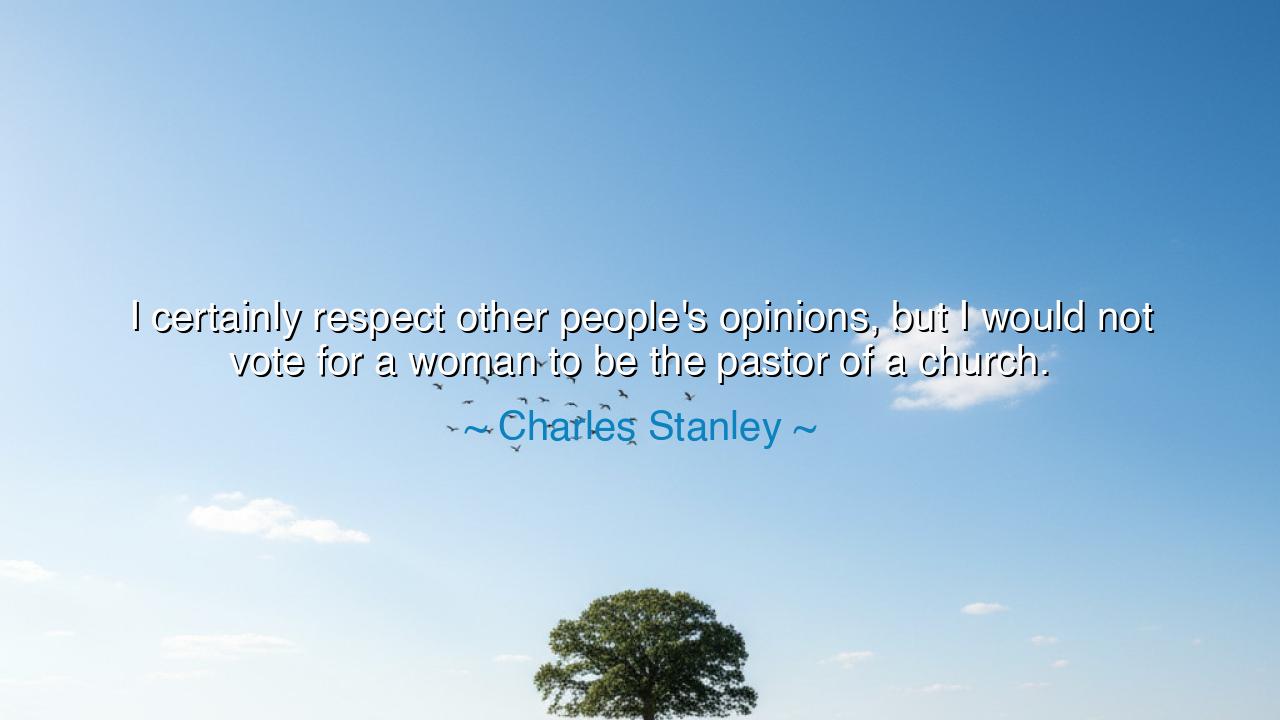
I certainly respect other people's opinions, but I would not vote
I certainly respect other people's opinions, but I would not vote for a woman to be the pastor of a church.






"I certainly respect other people's opinions, but I would not vote for a woman to be the pastor of a church." — Charles Stanley
Listen, O seekers of understanding, to the words of Charles Stanley, a preacher of conviction whose voice echoes with the certainty of faith and the burden of interpretation. When he declared, “I certainly respect other people's opinions, but I would not vote for a woman to be the pastor of a church,” he spoke from a place not of malice, but of belief rooted in scripture and tradition. His words arise from an age-old debate within the halls of faith — the question of authority, calling, and order within the sacred community. To grasp their meaning, one must not rush to judgment, but approach as the ancients did — with patience, reverence, and the desire to see truth from every side.
For Stanley was a man of the pulpit, molded by the doctrines of his time and the teachings of the Southern Baptist tradition, which holds that leadership in the church must mirror the early order described in the Holy Scriptures. To him, spiritual hierarchy was not a matter of worth or intelligence, but of divine structure — a pattern he believed established by God Himself. Thus, when he spoke of not choosing a woman to be pastor, it was not to diminish the strength of women, but to remain faithful to what he saw as an ordained design. He tempered his words with respect — for he said, “I respect other people’s opinions.” Even in disagreement, he offered courtesy, acknowledging that sincere believers may walk differing paths while seeking the same truth.
Yet within his statement lies a deeper struggle — the eternal tension between tradition and change, between the preservation of what is written and the awakening of what is possible. For throughout the ages, religion has stood as both anchor and wind — holding fast to the eternal while also being challenged by the rising tides of time. The ancients themselves wrestled with such questions: who may lead, who may teach, who may bear the voice of the divine? Even among prophets, the unexpected rose to greatness — Deborah, who judged Israel under the palm tree, Huldah, who spoke the word of the Lord to kings, Mary Magdalene, who was the first to proclaim the risen Christ. Their lives stand as eternal reminders that divine purpose is not bound by human expectation.
In this, the words of Stanley find their place not as final decree, but as part of the larger dialogue of faith — a conversation that stretches from the desert prophets to the modern church. His conviction reflects an ancient way: the desire to guard sacred order. Yet the voices that question him speak from another sacred impulse — the belief that the Spirit calls whom it will, that the flame of purpose may burn in both man and woman alike. Thus, both sides appeal to reverence; both claim fidelity to God. The true wisdom lies not in dismissing one or the other, but in seeking the heart of the divine that transcends them both.
History offers its own witnesses to this conflict. In the early 20th century, Aimee Semple McPherson, a woman of fiery faith, rose as one of the most powerful preachers of her time. Crowds filled stadiums to hear her words; she built churches, fed the poor, and drew thousands to the path of Christ. Yet she too was scorned by many who said, “A woman cannot lead.” Still, her voice could not be silenced, for her calling burned brighter than the conventions that sought to contain it. Hers is not a story of rebellion, but of devotion — a life that proved that divine vocation is a mystery no human structure can fully contain.
Thus, Stanley’s words, whether one agrees or not, remind us of a greater truth: that faith is not static. It lives, breathes, and wrestles with the times. The reverent must hold to their convictions with humility, remembering that wisdom grows through listening. And the reformer must challenge with grace, remembering that patience often softens the hardest soil. To respect other people’s opinions, as Stanley himself said, is to practice the first law of love — to honor conscience, even when it differs from our own.
So, O children of the present age, let this teaching settle in your hearts: disagreement need not destroy respect. Stand by your convictions, but hold them with compassion. Debate fiercely, but without contempt. For truth, like light, reveals itself not in the shout, but in the steady glow of sincerity. Whether one believes that the pulpit belongs to man or to woman, let the greater law prevail — the law of respect, humility, and divine purpose. For in the end, all who labor for goodness, justice, and faith serve the same eternal Master, who looks not upon the title or the form, but upon the heart.






AAdministratorAdministrator
Welcome, honored guests. Please leave a comment, we will respond soon